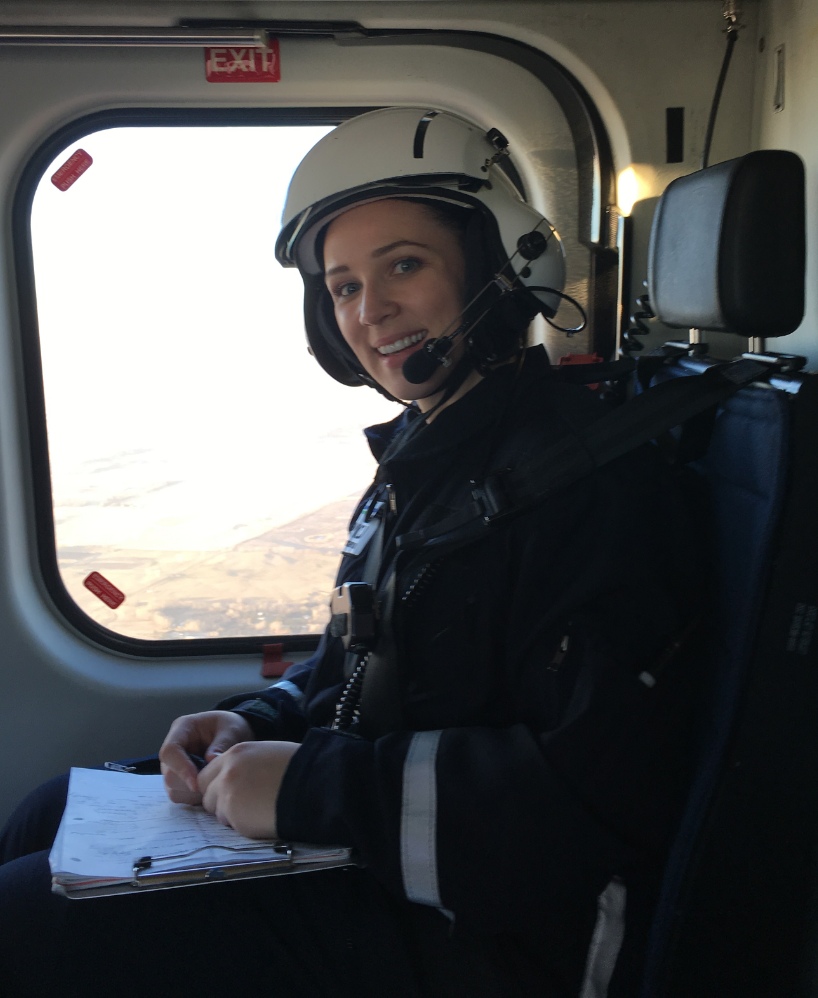
Jessica Hogan is the first University of Alberta nursing graduate to embark on a PhD in surgery. She is focusing on the development and implementation of a trauma registry in Western Kenya to improve limb- and life-saving care.
When volunteering in Kenya during nursing school-and in subsequent visits over the years-it didn't take long for Jessica Hogan, '09 BScN, to notice some surprising similarities between emergency health care there and in rural Alberta. What struck her most was how in both places, very sick or injured people must travel great distances to get the care they need at specialist trauma centres.
A Pediatric Intensive Care Unit flight nurse with the Stollery Children's Hospital, she recalls a time working in rural Alberta when that distance proved too great for one patient. "There was a little boy in a rural area of Alberta whose heart had stopped," she said. He had collapsed in the waiting room of the emergency department and Hogan and her colleagues were providing long-distance cardiac-care guidance to the rural team. Picking him up and providing CPR throughout the long trip back would not have resulted in a positive outcome.
"Had we brought him to Edmonton quickly, we could have put him on a heart-lung bypass," she remembered. "But unfortunately we weren't able to bring him back and he passed away." This reality check brought into focus the resource disparities between urban and rural environments here in Canada and how those disparities can become a matter of life and death.
Hogan's experiences abroad and at home have inspired her postgraduate research project. The first University of Alberta nursing graduate to embark on a PhD in surgery, she is focusing on the development and implementation of a trauma registry in Western Kenya to improve limb- and life-saving care.
"One of the potentials I saw in trauma registry development is that with a few fundamental changes you can see major increases in meaningful data. It's one example of how a little goes a long way," said Hogan. Similarly, training health-care providers in basic life support or improving data collection in an emergency department can result in a major improvement to patient care, she adds.
Choosing to pursue a PhD meant Hogan has been able to enjoy crucial support from the Department of Surgery, which was eager to get behind the unique project.
Hogan has been working since 2012 as a flight nurse, travelling with a team to stabilize and transport sick children from remote areas in western Canada that lack capacity or resources. These trips have provided her with opportunities to teach staff at isolated hospitals about advanced pediatric care, improving their comfort level and knowledge, she said.
Improving data with tools like a trauma registry means having a better understanding of how to enrich health care in rural settings, said Hogan. "Understanding the burden of trauma and patient outcomes is critical," she added. "When you realize what is threatening a population and how a system can improve, you can target public policy and resources to reduce those risks and improve lives."
Research roots
Hogan's passion for helping remote communities goes back to her student days. In her second year of nursing school, she started working with medical students to improve clean-water access in parts of rural Kenya.
Hogan has since returned to Kenya many times-to a water filter factory, the Moi Teaching & Referral Hospital and the Kenya Red Cross Office in Nairobi, the capital-and she has learned something different each time.
"Kenya is a beautifully unique country," she said. "The country has presented challenges that have created exceptionally resilient people, both in the community and within health care. The socioeconomic and political climate is such that you're forced to be innovative, but can still make impactful change. The priceless lessons learned from working in Kenya can apply to many other programs, benefiting other communities around the world."
In recent years, Hogan has expanded her global outreach beyond Kenya. In 2018, she played a key role in a team of cardiac specialists travelling to Sudan to perform cardiac surgery on children. During their mission at a local military hospital, Hogan taught nursing and provided post-operative care to patients.
The team led surgical intervention and post-operative care while collaborating with the host medical centre in education, support and feedback. When planned with sustainability in mind, trips like this build local capacity and train local competencies in surgeries, making the host medical centre more self-sufficient, explains Hogan.
"I learned a lot on that trip from the children, their families, the local community and hospital staff," Hogan recalled.
Wider implications
The significance of Hogan's trauma registry research goes beyond her own career, says her supervisor Tom Churchill. "It's a very valuable project-its implications are huge both for the department, which increases its international presence, and for Kenya and other developing countries."
It's also a project that's earning a great deal of support and recognition. This year, Hogan received the Trauma Association of Canada's Best Trainee Research Poster award for "Trauma Registry Implementation in a Western Kenya Referral Centre: Highlighting the Quality Improvement Approach."
And over the summer, she presented her research at the Office of Global Surgery's (OGS) Bethune Round Table conference on ethics in global surgery.
While the recognition is welcome, Hogan is focused on her work and what it can mean in the future.
"I'm excited for a future career that improves access to health care for marginalized populations," she said.
Jessica Hogan has served on the executive board of Innovative Canadians for Change (ICChange) and helped found the university's Office of Global Surgery (OGS).
Her trauma registry work is funded by Mitacs Accelerate, Acute Care Emergency Surgery (ACES) Services, OGS, ICChange, and the Graduate Citizenship and Queen Elizabeth II awards.